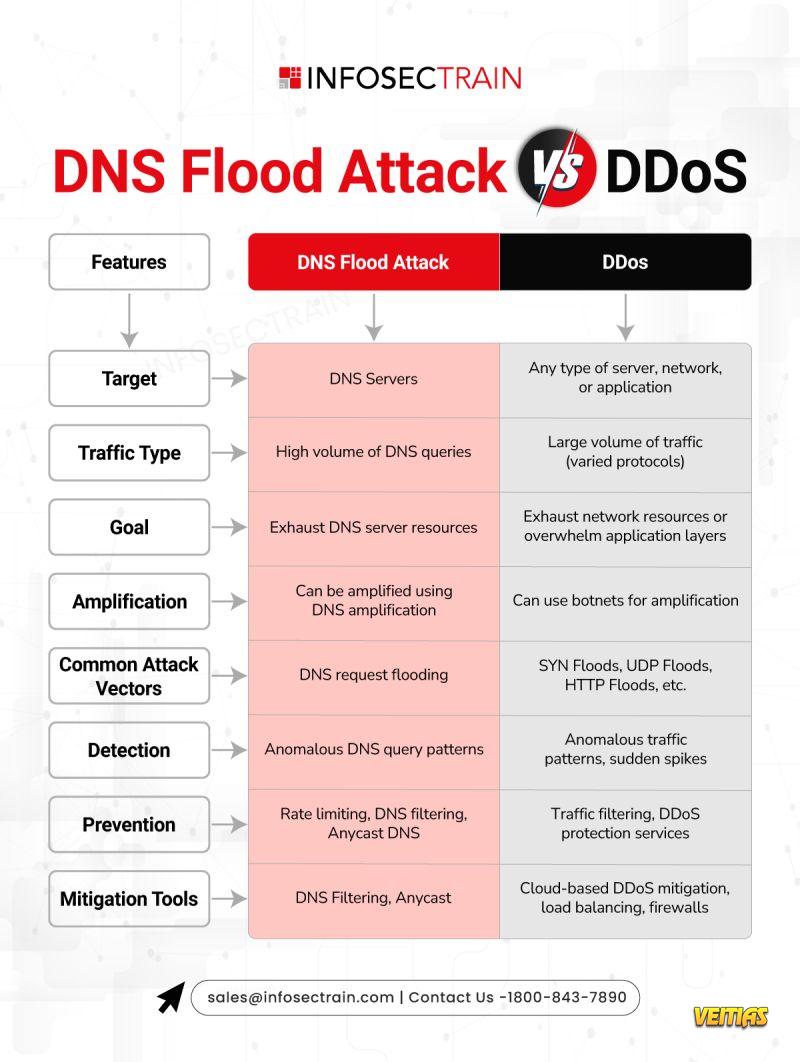𝐓𝐨𝐩 𝟏𝟎 𝐃𝐞𝐧𝐢𝐚𝐥 𝐨𝐟 𝐒𝐞𝐫𝐯𝐢𝐜𝐞 (𝐃𝐨𝐒) 𝐓𝐨𝐨𝐥𝐬 𝐭𝐨 𝐁𝐞 𝐀𝐰𝐚𝐫𝐞 𝐎𝐟
Denial of Service (DoS) attacks can cripple servers and networks by overwhelming them with excessive traffic. Here are the top 10 tools often used to launch these disruptive attacks:
Slowloris
Attack Type: Slow HTTP
Executes slow, resource-draining HTTP attacks on web servers by keeping connections open indefinitely, causing a denial of service.
LOIC (Low Orbit Ion Cannon)
Attack Type : High-Volume DoS
A popular tool for launching large-scale DoS attacks, often used in hacktivism campaigns. It sends massive traffic to overwhelm the target.
HOIC (High Orbit Ion Cannon )
Attack Type : Multi-Threaded DDoS
Amplified version of LOIC, designed for high-performance, multi-threaded distributed denial-of-service (DDoS) attacks.
UltraDDoS
Attack Type : Automated DDoS
A powerful tool for automating distributed denial-of-service (DDoS) attacks, often used for stress testing or malicious purposes.
PyDDoS
Attack Type : DDoS via Python
A Python-based tool that allows attackers to generate massive DDoS traffic to overload target systems and servers.
PyFlooder
Attack Type : Flooding
A lightweight Python script designed to flood a target with HTTP requests, causing the server to become unresponsive.
Xerxes
Attack Type : HTTP Flood
A high-performance tool specifically crafted for HTTP flood DoS attacks, overwhelming servers with a high volume of HTTP requests.
HULK (HTTP Unbearable Load King)
Attack Type : Unique HTTP Requests
Generates unique and highly effective HTTP requests to cause servers to crash or slow down, bypassing basic DoS defenses.
R-U-Dead-Yet (RUDY)
Attack Type : Slow HTTP POST
Launches slow HTTP POST attacks, keeping connections open for a long period and gradually exhausting server resources.
GoldenEye
Attack Type : HTTP DoS
A testing tool used to stress-test servers, specifically for simulating DoS attacks by flooding a web server with HTTP requests.
While these tools can be used for legitimate security testing, they are also frequently exploited for malicious purposes, causing significant damage to networks and systems. Understanding and protecting against DoS threats is crucial for cybersecurity defense.
#CyberSecurity #EthicalHacking #DoS #DenialOfService #NetworkSecurity
#CyberThreats #PenetrationTesting #InfoSec #CyberAttackTools
#NetworkTesting #HackingTools #ITSecurity #SecurityTesting #infosectrain #learntorise
🚨 𝐓𝐨𝐩 𝟏𝟎 𝐃𝐞𝐧𝐢𝐚𝐥 𝐨𝐟 𝐒𝐞𝐫𝐯𝐢𝐜𝐞 (𝐃𝐨𝐒) 𝐓𝐨𝐨𝐥𝐬 𝐭𝐨 𝐁𝐞 𝐀𝐰𝐚𝐫𝐞 𝐎𝐟 🚨
Denial of Service (DoS) attacks can cripple servers and networks by overwhelming them with excessive traffic. Here are the top 10 tools often used to launch these disruptive attacks:
Slowloris
🌐 Attack Type: Slow HTTP
Executes slow, resource-draining HTTP attacks on web servers by keeping connections open indefinitely, causing a denial of service.
LOIC (Low Orbit Ion Cannon)
💥 Attack Type : High-Volume DoS
A popular tool for launching large-scale DoS attacks, often used in hacktivism campaigns. It sends massive traffic to overwhelm the target.
HOIC (High Orbit Ion Cannon )
🚀 Attack Type : Multi-Threaded DDoS
Amplified version of LOIC, designed for high-performance, multi-threaded distributed denial-of-service (DDoS) attacks.
UltraDDoS
⚡ Attack Type : Automated DDoS
A powerful tool for automating distributed denial-of-service (DDoS) attacks, often used for stress testing or malicious purposes.
PyDDoS
🐍 Attack Type : DDoS via Python
A Python-based tool that allows attackers to generate massive DDoS traffic to overload target systems and servers.
PyFlooder
🌊 Attack Type : Flooding
A lightweight Python script designed to flood a target with HTTP requests, causing the server to become unresponsive.
Xerxes
💻 Attack Type : HTTP Flood
A high-performance tool specifically crafted for HTTP flood DoS attacks, overwhelming servers with a high volume of HTTP requests.
HULK (HTTP Unbearable Load King)
🔥 Attack Type : Unique HTTP Requests
Generates unique and highly effective HTTP requests to cause servers to crash or slow down, bypassing basic DoS defenses.
R-U-Dead-Yet (RUDY)
💀 Attack Type : Slow HTTP POST
Launches slow HTTP POST attacks, keeping connections open for a long period and gradually exhausting server resources.
GoldenEye
⚙️ Attack Type : HTTP DoS
A testing tool used to stress-test servers, specifically for simulating DoS attacks by flooding a web server with HTTP requests.
While these tools can be used for legitimate security testing, they are also frequently exploited for malicious purposes, causing significant damage to networks and systems. Understanding and protecting against DoS threats is crucial for cybersecurity defense.
#CyberSecurity #EthicalHacking #DoS #DenialOfService #NetworkSecurity #CyberThreats #PenetrationTesting #InfoSec #CyberAttackTools #NetworkTesting #HackingTools #ITSecurity #SecurityTesting #infosectrain #learntorise








